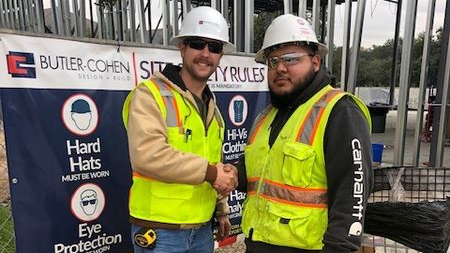
Fight Fire with…Calm, Controlled Decision-Making
Here at Butler-Cohen, we recognize that every team member brings something unique and valuable to every job. Recently, we sat down (virtually—he’s always on the job site!) with Cameron Elles to talk a little about his work as a Site Manager. In everything he does for Butler-Cohen, Cameron treats fire safety like it’s his second job… because it actually is his second job. In addition to his full-time career here, Cameron is a Fire Chief with the Crosby Volunteer Fire Department. No doubt readers of this blog will be familiar with the figurative (and hopefully not literal) “fires” that many in the construction industry must put out on a day-to-day basis. Therefore, we are thrilled to share Cameron’s perspective on running a job with the mindset of someone who has actually been tried by fire. [Interview has been edited/condensed for clarity. Pictured above pre-covid, Cameron (left) is congratulating one of our valued subcontractors on being recognized for our weekly Empowerment Award.]
BC: What is your construction background?
CE: I’ve been in the construction industry for close to 14 years now. I started in the electrical field. My dad owned a few electrical companies here in Houston, and was an electrical contractor for 35+ years in Houston. I started there, and worked at a couple of companies, in the field as an electrician. I eventually became a journeyman electrician and went back to school to get my construction management degree for general contracting. After graduation, I was hired by a general contractor. I was there for right at 5 years before I came to Butler-Cohen in May of 2019.
For people who ask me how young I am, I tell them I’ve got almost 14 years in the construction industry, and they ask how old I am and they say the math doesn’t add up, but I was literally in construction at the age of 16 as a laborer running some crews and in a warehouse position.
BC: Tell us about your decision-making and problem-solving on a job.
CE: A lot of my decision-making comes from my background with the fire department because that is a fast-moving industry and you do have to make decisions on the fly that you know will work and are safe, not only for my task, but for the guys I have underneath me. I need to know that what I’m telling them to do is right.
So I take that decision-making process and apply it to my construction work, and that’s always just to keep everything at a level-playing field. I try not to get hyped up about anything and not to jump to getting anything done too quickly, because there is always enough time to step back and make that decision. You’ve always got to look at everything from different angles. There are always 1000 ways to do anything.
BC: What other skills from your time as a firefighter have translated into running a job well?
CE: So many skills translate, especially from a fire safety perspective. On a jobsite, there are so many different ways you can apply fire science and fire safety, beyond just firefighting. From the means and methods on the jobsite to how you’re storing materials to making sure you have the proper fire extinguishers for the task you’re performing. An ABC extinguisher may not always be the right extinguisher for the task. You may need something different. You need to know how fire washes come into play. The firefighting world plays into how jobs get built, not just from a safety side but for the life safety system also. As someone running a job site, I need to know how the fire alarm system is going to work or how the sprinkler system is going to work.
Because of my firefighting background, I have the ability to look so far ahead into a project. When we start construction, I’m thinking about, “What happens if the fire dept comes in and they can’t get here, or they can’t get here, and what are they going to do?” I know how they operate because that’s what I’ve done. I’m able to think like them and as a fireman, if I can’t open the door, I’m going to cut it open. Those kinds of things come up and if I can bring those up, I can mitigate costs with the owner.
The firefighting world definitely plays a lot into how I make my decisions and run my jobsites. A lot of that training not just from fire science side, but also from confined space and rescue training, air monitor training, AED/CPR…all those things can apply to the construction world.
BC: Talk a little about your background as a firefighter.
CE: My parents’ house caught fire in 2002 and was a complete loss. As soon as I was of age to join the fire department, I did. I joined as a junior in high school. I was the lowest of the low at age 16. I was still in high school, I still had to keep up my grades to be a part of the department. It’s like extracurricular activity or athletics. If I wasn’t passing, I couldn’t participate. They made sure schooling was my top priority.
I worked my way from a junior to a black hat—a full member—so I’ve completed all necessary state trainings to be a full-fledged firefighter in the state of Texas. Once I was eligible to run for an office, I ran for a captain position, so I was a captain for a few years. In December of 2015, I was nominated for a district chief position. We have 7 executive board officers which are all called white hats. I’ve been a fire chief since 2015. So I’ve been with the fire department for 13 years now.
